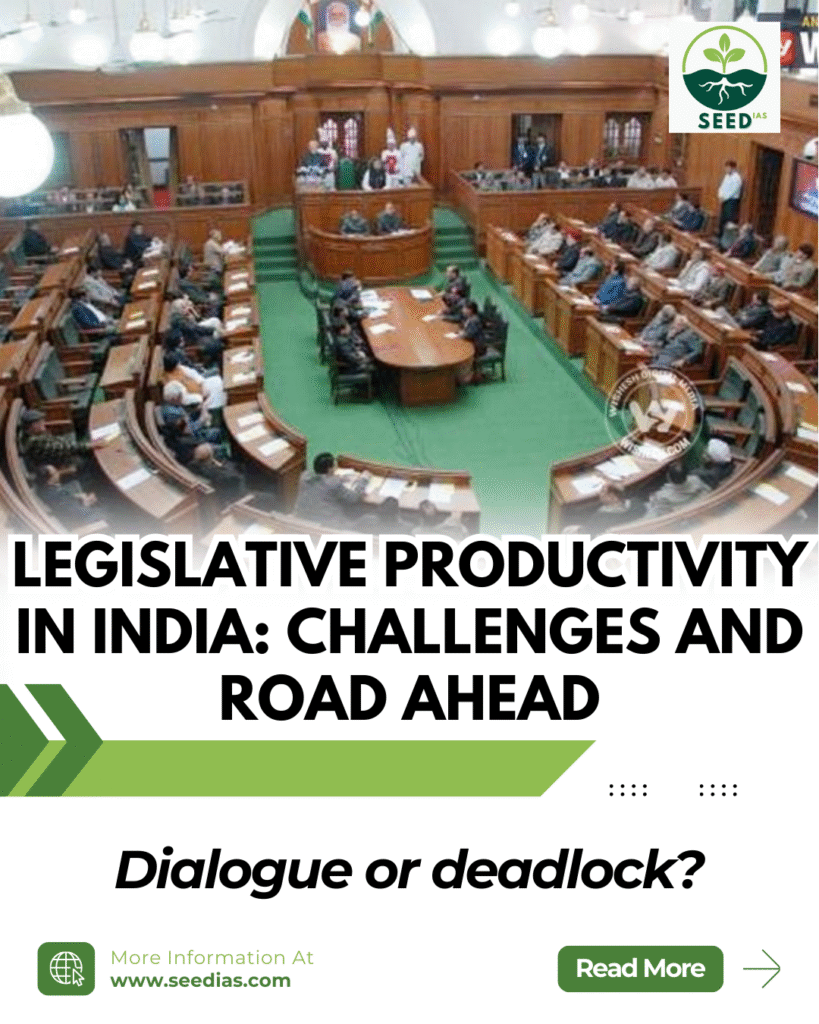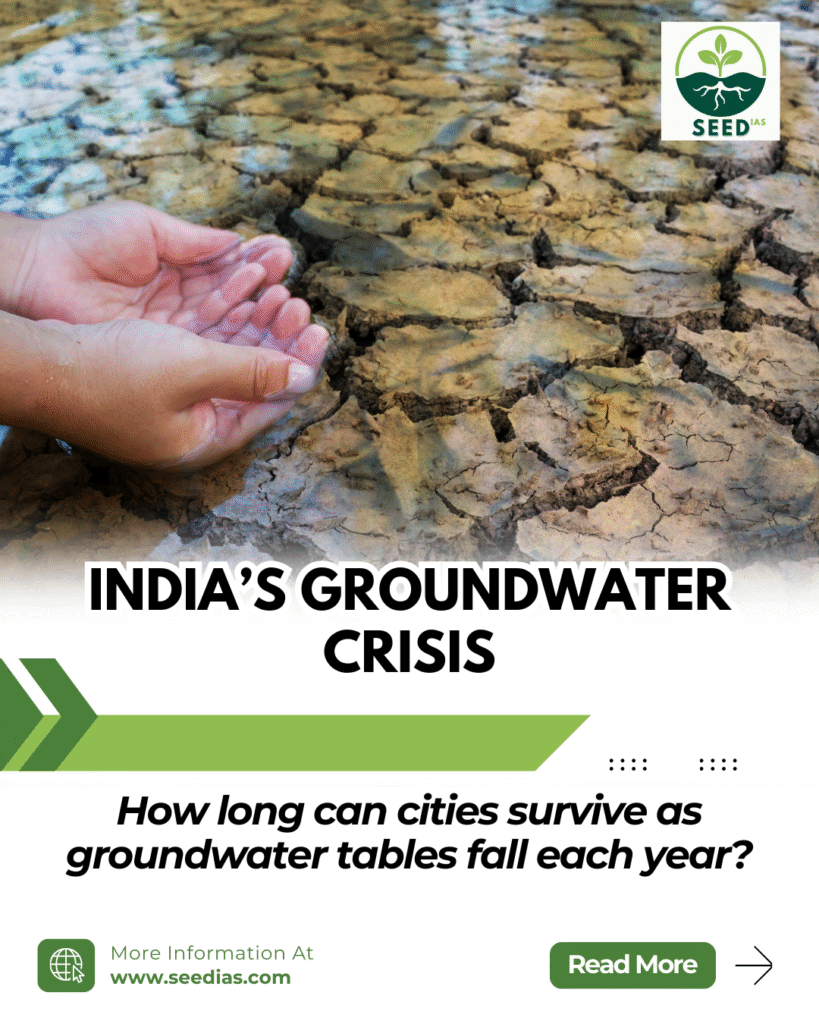Why in NEWS
The Lok Sabha Speaker, at the National Conference of Urban Local Bodies Chairpersons, emphasized the urgent need to improve the quality of legislative discourse and enhance productivity in Indian legislatures.
Key Concepts and Definitions
| Term | Definition |
|---|---|
| Legislative Productivity | Efficiency in lawmaking, oversight, budget approval, and public discourse. |
| Quorum | Minimum number of members required to conduct legislative business. |
| Private Member Bill | A bill introduced by a legislator who is not a minister. |
| Zero Hour | Time immediately after Question Hour for raising urgent public matters. |
| Joint Sitting | A mechanism under Article 108 to resolve legislative deadlocks. |
What is the Status of Legislative Productivity in India?
| Aspect | Current Status |
|---|---|
| Sitting Days | Declined from ~135/year (1st LS) to ~55/year (17th LS) |
| Session Time | Only 33% (LS) and 24% (RS) of scheduled time used in 2023 Budget Session |
| MP Participation | Average attendance at 79%, but only ~45 debates per MP in the 17th Lok Sabha |
| Disruptions | 15th Lok Sabha lost over 30% time to disruptions |
| Committee Referrals | Only 10% Bills referred in 17th LS vs. 60% (14th), 71% (15th), 25% (16th) |
| Private Member Bills | 14 passed since 1950, last in 1970 |
| Deputy Speaker Post | Vacant throughout the 17th Lok Sabha despite Article 93 mandate |
| Question Hour | Utilized for only 19% (LS) and 9% (RS) of time in 17th LS |
| Joint Sittings | Used only 3 times since 1950 |
Key Implications of Low Legislative Productivity
| Impact Area | Consequences |
|---|---|
| Oversight Weakening | Fewer sittings and disruptions reduce checks on executive power |
| Poor Lawmaking Quality | Bills passed without debate or committee review face legal/implementation risks |
| Opposition Marginalized | Limited role in shaping legislation; dissent voices weakened |
| Public Trust Erodes | Citizens lose faith in democratic institutions and processes |
| Executive Overreach | Ordinances and orders bypass legislative scrutiny |
What Measures Have Been Taken?
| Measure | Purpose |
|---|---|
| Code of Conduct for MPs | To uphold decorum and reduce disruptions |
| Digital Parliament | e-Vidhan (NeVA), livestreaming to enhance transparency |
| Strengthened Committees | In-depth review of Bills and executive actions |
| Disciplinary Mechanisms | Suspension and expulsion for rule violations |
| Capacity Building | Training sessions, workshops, and orientation for MPs |
What Steps Can Be Taken to Improve Legislative Productivity?
| Reform Area | Recommendations |
|---|---|
| Institutional Discipline | Mandate minimum sittings, adopt fixed calendars, standardize procedures |
| Strengthen Committees | Make committee referrals mandatory, pre-legislative consultations |
| Transparency & Accountability | Publish MP attendance, debate records, ensure live streaming |
| Dialogue over Disruption | Promote consensus-building and cross-party consultation |
| Training & Recognition | Orientation for new MPs, awards for top performers |
| Adopt Global Best Practices | IPU norms, fixed sittings (UK), committee scrutiny (Germany), benchmarking |
| International Exchange | MP/MLA programs with UK, Canada, Australia for ethical and procedural learning |
In a Nutshell
Memory Code – “SCORE PAD”
Sittings
Committees
Opposition
Responsibility
Ethics
Public trust
Accountability
Dialogue
Prelims Practice Questions
- Which of the following statements is true about the Deputy Speaker of Lok Sabha?
A) The President appoints the Deputy Speaker.
B) The position is filled through Rajya Sabha elections.
C) Article 93 mandates the election “as soon as possible.”
D) The Speaker appoints the Deputy Speaker. - Which parliamentary session in 2023 was among the shortest since 1952?
A) Monsoon Session
B) Budget Session
C) Winter Session
D) Special Session - Which of the following is a Private Member Bill?
A) Introduced by a Cabinet Minister
B) Introduced by the Prime Minister
C) Introduced by any MP not part of the Council of Ministers
D) Introduced during a joint sitting
Mains Questions
- Critically evaluate the decline in legislative productivity in India and suggest measures to enhance it. 15 marks (GS Paper 2 – Governance)
- How does the decreasing role of parliamentary committees impact democratic functioning in India? 10 marks (GS Paper 2 – Polity)
Answers to Prelims Questions
| Question | Correct Answer | Explanation |
|---|---|---|
| 1 | C | Article 93 mandates the Deputy Speaker election “as soon as may be.” |
| 2 | B | The 2023 Budget Session was the 6th shortest since 1952. |
| 3 | C | A Private Member Bill is introduced by any MP who is not a minister. |














